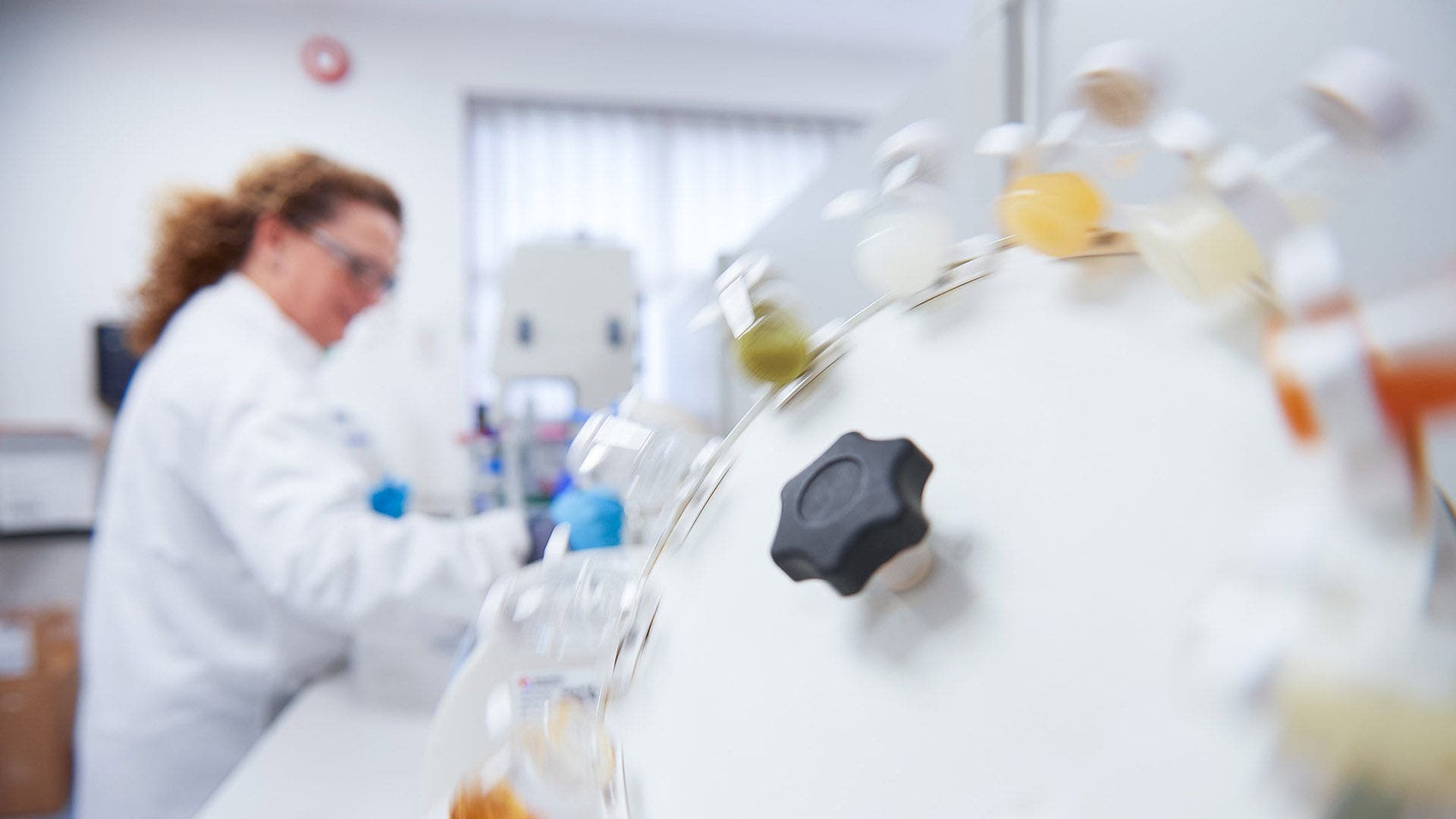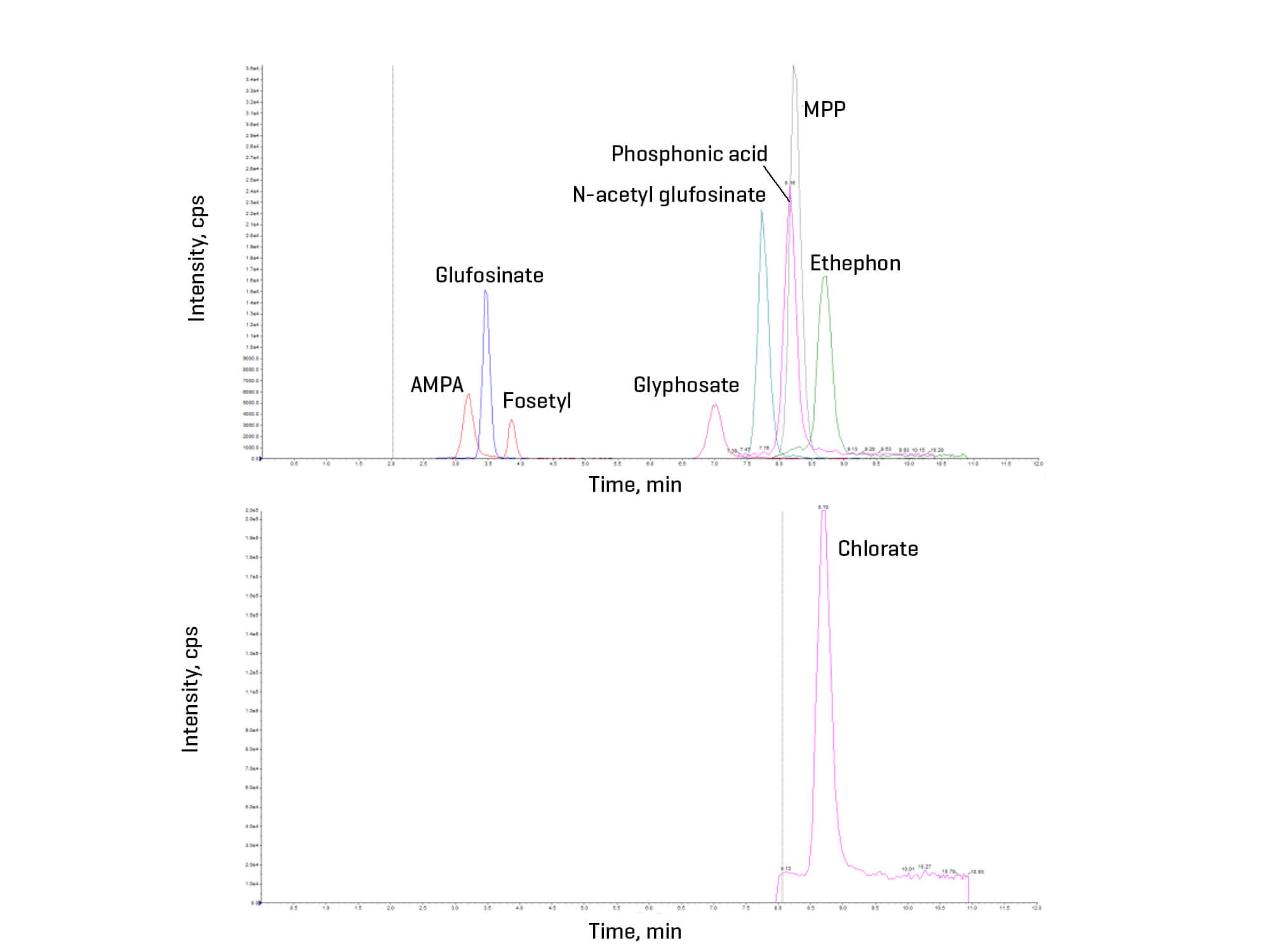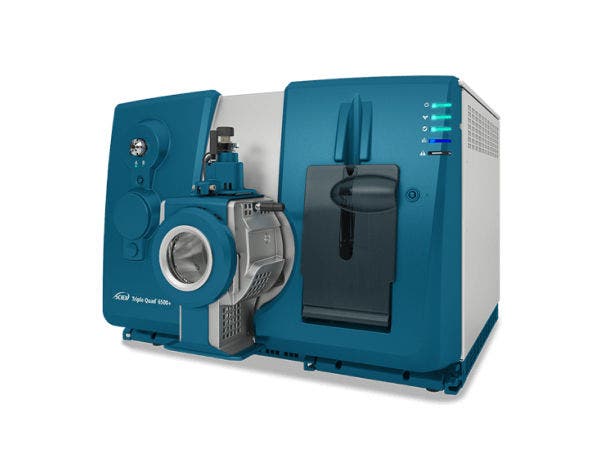Maximize uptime and let SCIEX help you become your customer's most reliable lab.
Pesticide testing

Food science- An appetite for accurate mass
Listen to the ASMS talk of Prof. Amadeo Fernandez-Alba and learn about HRMS application in food science.
Multiresidue methods
Leading the way in pesticide residue testing
When it comes to the mass spectrometry analysis of pesticides, SCIEX understands what you need for your multiresidue methods. Prioritizing direct feedback from customers help us address these challenges in your lab:
- Sensitivity and selectivity
- Diverse chemical properties
- Matrix effects
- Parent compounds, metabolites and degradation products
- Data analysis and Interpretation
- Regulatory requirements
- Method validation requires extensive testing
- Sample throughput and analysis time
- Adaptation to evolving requirements
In addition to these advantages, SCIEX systems are highly regarded for their robustness. The Turbo V source design enables you to handle even the most challenging matrices, increasing uptime for your lab and delivering predictable dates to get results to your customers.
Our team of experts provides comprehensive support to elevate your pesticide testing capabilities. SCIEX OS software is easy to learn and simplifies data processing, making your days in the lab easier.
Work smarter, not harder.
Your staff will thank you.
Featured pesticide testing resources high-resolution mass spectrometry
-
Webinar
Together with the European Reference Laboratory for Pesticide Residues in Fruits and Vegetables (EURL-FV)
Prof. Amadeo Fernadez-Alba and his team from EURL-FV in Almeria in Spain are collaborating with SCIEX to push the boundaries of pesticide testing. Learn more about non-targeted pesticide screening with ZenoTOF, Saffron adulteration with colorants, pesticide residues in APIStrip bee colony samplers and high resolution MS/MS Library.
-
Technical note
Highly sensitive pesticide detection with a high degree of selectivity and identification
The technological enhancements afforded by the ZenoTOF 7600 system, bring QTOF systems into a new era of sensitivity and precision for pesticide analysis.
-
Webinar
Nofalab webinar - The use of a QTOF in a contract laboratory for routine pesticide analysis in food and feed
The SCIEX X500R QTOF system with SWATH DIA provides MS and MS/MS spectra for the quantitative and qualitative analysis of pesticides in food.
-
Technical note
Suspect screening data processing workflow for the analysis of pesticide in food using the SCIEX OS software
This technical note describes a suspect screening data processing workflow in the SCIEX OS software for the non-targeted analysis of pesticides in fruits, vegetables and herbs.
Featured pesticide testing resources with nominal mass spectrometry
-
Technical note
Highly sensitive analysis of multi-compound panels in various matrices for food regulations
Here, over 1400 MRM transitions for 700 compounds were analyzed in a single analysis, achieving quantitation limits of 0.2 ng/mL for the majority of the pesticides tested.
-
Technical note
Pyrethroids and macrocyclic lactone insecticides
Learn about the simultaneous quantitation at detection levels below the maximum residue level defined by the European Commission under regulation (EU) 2018/1514.
-
Technical note
Ultra-fast MRM acquisition and quantitation of food contaminants in multiple food matrices
This technical note describes the analysis of over 600 pesticides and mycotoxins in a single injection using a fast MRM acquisition rate method on the SCIEX 7500+ system.
-
Technical note
Direct injection analysis of pesticides in fruit juices on a next-generation, highly robust triple quadrupole mass spectrometer
In this technical note, a comparative study was performed to evaluate the sensitivity performance of the SCIEX 7500 system and the SCIEX 7500+system for the quantitation of pesticides in orange juice.
Polar pesticide analysis
Nofalab, LDAR24 and SCIEX share valuable methods to elevate analytical excellence
Many laboratories encounter difficulties when analyzing polar pesticides such as glyphosate, glufosinate, AMPA, and fosetyl-aluminium. One of the major hurdles with polar pesticides is their tendency to have low retention times on reversed-phase LC columns due to their high polarity. This can result in poor separation, coelution with matrix components, and difficulties in achieving baseline resolution. Matrix-facilitated ion suppression or enhancement can adversely affect the accuracy and precision of quantitation. Polar compounds, especially when present in low concentrations, may not ionize as efficiently as nonpolar compounds, resulting in lower signal intensities. To overcome these challenges, careful consideration of mobile phase composition and sample cleanup is essential for the successful implementation and robustness of the analytical method.
The method employs an ion chromatography (IC) column within a reverse phase (RP) system that utilizes mobile phases compatible with MS at a pH of approximately 9. These specific conditions optimize the detection of glyphosate using MS, achieving good retention and separation of the other analytes. This allows for the inclusion of as many polar pesticides as possible in a single analysis. The use of a QTRAP system further validates positive results through the acquisition of full-scan MS/MS spectra.
- Suitable for difficult matrices such as herbs and spices. Large injection volumes make it possible to analyze water samples as well, all on the same column.
- Column robustness over 2000 injections
- Stability and signal intensity over 3 months

Featured polar pesticide testing resources
-
Webinar
A robust analysis of glyphosate and other polar pesticides - A challenge no more
A robust and sensitive method for the analysis of polar pesticides (43 min)
-
Technical note
A robust and sensitive method for the direct analysis of polar pesticides without derivatization
A non-derivatized method using LC-MS/MS for quick and simple detection and quantitation of glyphosate and other polar pesticides in food, feed and water commodities
-
Technical note
Trace level detection of glyphosate in water and beer samples
Very simple sample preparation using large volume injections of either water or diluted beer
-
Technical note
Direct analysis of polar pesticides in water: a routine accredited method
Discover a platform workflow with the unique capability for isomer differentiation and localization of labile PTMs
Large panel pesticide workflow
Keep your pesticide lab running
- High sensitivity and robust triple quad systems
- Intuitive software for all your data processing needs
Delivering the perfect balance of speed, performance, and sensitivity for your most challenges analytes.
Unleash the analytical power of the next-generation software platform for data acquisition and processing.
Keep your instruments performing at their peak, with multiple options for response time, repair coverage and maintenance.
Outlier removal with SCIEX OS
Watch this 5 min video to see how easy it is to remove outliers from calibration lines in pesticide analysis.
We understand the needs of residue testing laboratories
From listening to our customers, we understand that residue testing laboratories face challenges ranging from technological and regulatory hurdles to operational and ethical considerations:
- Analytical sensitivity and specificity
- Regulatory compliance
- Data management and reporting of large
- data volumes
- Sample matrix complexity
- Multiresidue analysis and metabolites
- Personnel training and expertise
- Equipment maintenance and calibration
- Emerging contaminants
- Maintaining transparency and preserving trust with clients and regulatory bodies
- Cost constraints related to equipment, staff and compliance
Our teams will customize a solution for you, guiding you through every step, from initial consultations to post-installation support and efficient data management.
We are with you every step of the way.
All resources
-
Hub
Scout triggered MRM [stMRM]
SCIEX OS software offers an exciting, data-rich workflow called scout triggered MRM [stMRM]. Intelligent monitoring of the designated marker analytes increases efficiency and reduces the demand for method maintenance.
-
Poster
Detection of pesticide 1080 in milk and infant formula using the SCIEX QTRAP 6500+ system
Sample preparation and LC setup was adopted from AOAC First Action Official Method 2015.03.
-
Technical note
Quantitation of dicamba and acid herbicides in agricultural field samples on SCIEX QTRAP 6500+ system
LC-MS/MS methods can utilize negative mode electrospray ionization (ESI−) with great sensitivity replacing derivatization GC methods.
-
Technical note
X500R QTOF system with SWATH Acquisition for pesticide residue screening in fruits and vegetables
SWATH screening and quantitative methods for the 190 most commonly monitored pesticides for the Chinese Ministry of Agriculture risk assessment.
-
Technical note
Pesticide residues in produce analyzed by targeted MRMHR “Full- Scan” acquisition and processing
Multiple MRMHR traces can be generated without having multiple specific transitions defined during acquisition.
-
Technical note
Confirmation of pesticides in jalapeno peppers using QTRAP MS/MS data and library matching in SCIEX OS-Q
The MS method was set up with a targeted MRM list of 200+ pesticides. IDA (Information Dependent Acquisition) criteria were defined such that Enhanced Product Ion (EPI) acquisition would be triggered when an MRM signal exceeded a threshold of 2000 cps.
-
Technical note
Quantitation and identification of the pesticide malathion in fruit samples using MRM3 workflow
The traditional MRM and MRM3 modes were compared with results showing that the higher selectivity of MRM3 eliminates background and matrix interference, resulting in better data quality.
-
Technical note
Quantitation of acetamiprid & prochloraz in black pepper using the SCIEX Triple Quad 3500 System
For both the analytes, a LLOQ of 1 ppb was achieved, which was easily below the MRL level as mentioned by FSSAI (MRL – 10 ppb) and European Union (MRL – 100 ppb) regulatory bodies.
-
Technical note
LC-MS/MS analysis method for 51 pesticides routinely monitored by the ministry of agriculture found in vegetables and fruits
This method analyses 51 pesticides with a 7.5 minute runtime. Sample preparation adopts the internationally accepted QuEChERS (AOAC 2007.1) method with chives, beans and strawberries.
-
Technical note
LC-MS/MS rapid quantitation and screening method for 222 pesticide residues in tea
This single injection method uses the QuEChERS for sample pre-treatment and provides high throughput and broad screening for the quantification of 222 pesticides in tea matrix.
-
Technical note
Improving selectivity of triazole derivative metabolites - Using SelexION® Differential Mobility Separation Technology
1,2,4-triazole (TRZ), triazole alanine (TAL), triazole acetic acid (TAA) and triazole lactic acid (TLA) are metabolites that commonly occur as plant or soil metabolites of triazole fungicides. Detection of triazole derivative metabolites at LOQ levels of 0.01 mg/kg with high accuracy was achieved.
-
Technical note
High chromatography reproducibility enables large panel MRM assays for pesticides in fruit and vegetables
Precise and stable solvent flow delivering less than 0.1% coefficient of variation (CV) retention time variation allows the use of Scheduled MRM algorithm to monitor a large panel of over 200 compounds.
-
Technical note
The benefits of MRM3 for the analysis of contaminants in food and water
Here, improvements in S/N using MRM3 have been shown in tea, a complex food matrix.
-
Technical note
Analysis of pesticides in food in compliance with EU regulations using the SCIEX X500R QTOF system
A very high mass accuracy can be obtained on the MS/MS, including the for small ions with m/z < 200 Da.
-
Webinar
Pesticides analysis on the SCIEX Triple Quad 7500 system
See how we analyze 700 compounds with more than 1400 MRM transitions in a single analysis of 10 different food matrices.
-
Technical note
Direct injection analysis of pesticides in fruit juices on a next-generation, highly robust triple quadrupole mass spectrometer
In this technical note, a comparative study was performed to evaluate the sensitivity performance of the SCIEX 7500 system and the SCIEX 7500+system for the quantitation of pesticides in orange juice.
-
Technical note
Simultaneous LC-MS/MS quantitation of 180 pesticides in tea
This technical note describes the quantitation of 180 pesticides in tea. The SCIEX Triple Quad 4500 system achieved sub-ng/mL in-vial limits of quantitation (LOQs) in both aqueous and matrix-matched calibration with suitable mean accuracy and precision (n = 3)
-
Technical note
Improving confidence in pesticides identification in food using QTRAP technology
This technical note describes aMS/MS spectral library searching workflow for confident identification of >200 pesticides in orange juice on the SCIEX 5500+ system. The QTRAP technology of the SCIEX 5500+system enabled data-dependent acquisition (DDA) of enhanced product ion (EPI) scans to produce MS/MS spectra that were used to compare against mass spectral libraries for improved compound identification confidence
-
Technical note
Ultra-fast MRM acquisition and quantitation of food contaminants in multiple food matrices
This technical note describes the analysis of over 600 pesticides and mycotoxins in a single injection using a fast MRM acquisition rate method on the SCIEX 7500+ system. Good data quality was shown with an MRM acquisition rate as low as 3 ms (1 ms dwell time and 2 ms pause time)while maintaining instrument sensitivity, accuracy and precision.

